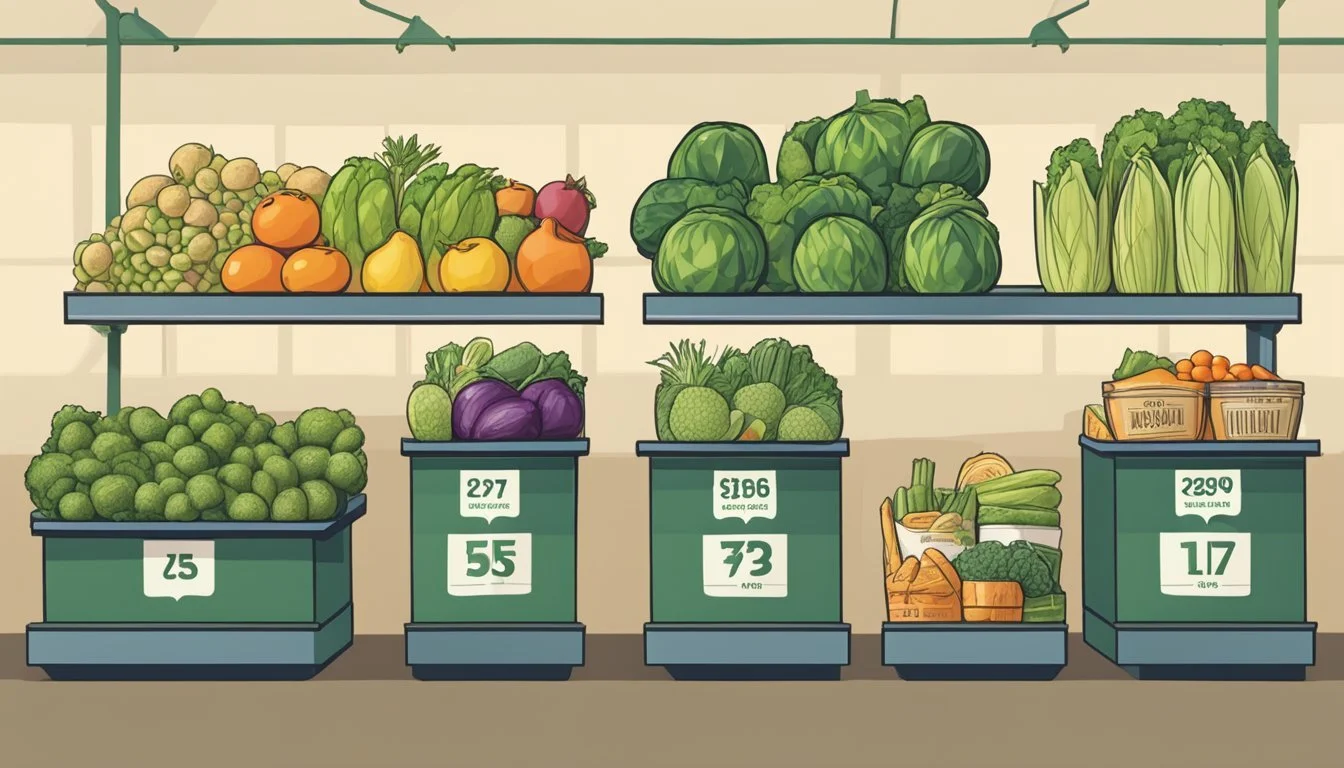Is Whole Foods Cheaper Than Sprouts?
Pricing Comparison Analysis
Part of Our Grocery Store Guide with Details on Whole Foods Market Prices and Sprouts Farmers Market Prices
The debate between Whole Foods and Sprouts Farmers Market is a common one among budget-conscious shoppers looking for quality groceries. With the acquisition of Whole Foods by Amazon in 2017, the pricing structure of this upscale grocery store chain has been a topic of interest. Reports show that after the acquisition, Whole Foods has reduced its prices, making it about 1.3% cheaper than Sprouts on average, a shift from the earlier scenario where Sprouts used to be the more budget-friendly option.
Sprouts, known for its fresh produce and health-centric offerings, has built a reputation for being cost-effective, especially prior to the Whole Foods acquisition by Amazon. However, despite the price changes at Whole Foods, it is still widely recognized that Sprouts may offer better deals in specific categories like produce and meat where they excel. The price comparison between the two can be nuanced and often depends on the types of products and the shopping experience one is looking for.
Navigating the decision between shopping at Whole Foods or Sprouts goes beyond mere price comparison. Factors such as store location, product selection, quality of service, and additional amenities like curbside pickup or ready-made meals all play a vital role in determining where consumers decide to spend their grocery dollars. While Sprouts offers curbside pickup for a small fee, starting at $1.99, the spectrum of services and convenience factors at each store might tip the scales for some shoppers despite the price tags.
Overview of Whole Foods and Sprouts
Whole Foods Market and Sprouts Farmers Market are two prominent grocery stores both known for their focus on quality and natural products. Whole Foods Market, established in 1980, has built a reputation around offering products that are 100% all-natural or organic. Their commitment to health and quality has positioned them as a leader in organic and natural foods.
Sprouts Farmers Market, with a similar emphasis on fresh produce and health-focused products, caters to customers looking for natural and organic options at competitive prices. Sprouts differentiate themselves by offering a mix of natural, organic, and conventional items, thus providing a wider range of choices to suit various consumer needs.
The product selection at Whole Foods tends to be broader. Whole Foods boasts approximately 22,000 products, contrasted with Sprouts' 17,100, suggesting that customers may find a more diverse array of goods at Whole Foods.
Regarding the store environment, Whole Foods Market typically offers additional amenities such as a hot food bar, salad bar, and juice bar, augmenting the shopping experience with ready-to-eat options. Sprouts, on the other hand, may not have extensive hot meal services, but it provides a selection of ready-to-eat cold side dishes.
When comparing organic offerings, both stores prioritize organic and natural products, though Whole Foods maintains a strict adherence to these attributes across its entire product range.
In terms of quality, both grocery stores are committed to providing high-quality products, but their approaches and assortments vary, reflecting their unique brand philosophies and target markets.
Whole Foods Market Sprouts Farmers Market Organic and natural focus Natural and organic with conventional items Approx. 22,000 products Approx. 17,100 products Hot food and salad bar Cold ready-to-eat side dishes Often higher priced Generally competitive pricing
Price Analysis
This section examines specific pricing differences between Whole Foods and Sprouts across various categories, taking into account the variability in cost when it comes to organic produce, meat and seafood, as well as bakery and dairy products. Special attention is given to the influence of sales, discounts, and membership benefits, such as those from Amazon Prime, on overall affordability.
General Pricing Structure
Whole Foods has been historically perceived as more expensive. However, since its acquisition by Amazon, some prices have been reduced. On the other hand, Sprouts, generally known for their affordable prices, maintains a competitive edge in their pricing strategy, especially for those looking for lower-cost options.
Cost of Organic Produce
When it comes to organic produce, Sprouts often offers more affordable prices. A comparison shows Sprouts with organic produce priced at $27.08, while Whole Foods comes in at $31.14. This reflects a savings of approximately 13.04% at Sprouts.
Comparison of Meat and Seafood Prices
Meat and seafood prices can significantly vary between stores. Whole Foods markets itself on quality, which can result in higher prices compared to Sprouts. For example, customers might find that the same cut of organic chicken or wild-caught salmon may cost less at Sprouts than at Whole Foods.
Bakery and Dairy Product Pricing
The bakery and dairy sections offer an interesting contrast. Sprouts generally provides cost-effective options for everyday items. However, Whole Foods, with occasional Amazon Prime deals and sales, can close the price gap, making their premium, artisanal products more competitive.
Additional Costs and Discounts
Beyond shelf prices, one must consider membership benefits and store-specific discounts. Whole Foods offers discounts to Amazon Prime members, which can make certain products more affordable. Conversely, Sprouts has a reputation for frequent sales on various items, providing opportunities for savings without a membership.
Product Selection and Quality
When comparing Whole Foods and Sprouts, one must consider the range of organic products, the availability of local and non-GMO options, the freshness of the produce, and the variety of specialty health items they offer.
Range of Organic Foods
Whole Foods commits to offering products that are 100% all-natural or organic. Shoppers are less likely to encounter items with artificial ingredients, making it a prime destination for consumers prioritizing organic produce and organic foods. On the other hand, Sprouts also offers a substantial selection of organic items, but it includes some products with artificial ingredients.
Availability of Local and Non-GMO Produce
At Whole Foods, there is a strong emphasis on stocking local produce and non-GMO products, catering to those who are eco-conscious or particular about sourcing. Sprouts also positions itself as a store prioritizing non-GMO and local produce, but specific offerings can vary based on location and season.
Freshness of Produce Department
Customers often praise Whole Foods for the freshness of its produce department, including a vibrant selection of fresh salads and quality produce. Sprouts is also recognized for its fresh produce, with a business model that focuses on offering fresh, natural foods at affordable prices.
Specialty Items and Health Foods
Whole Foods is known for an extensive variety of specialty items and health foods, encompassing everything from gluten-free options to exotic fruits. Sprouts, while smaller in scale, prides itself on a well-curated selection of health-focused foods, including abundant organic options that cater to a similar demographic.
Each store has its strengths, with Whole Foods leading in organic certification and breadth of specialty items, while Sprouts offers a competitive, though not as extensive, range of healthy, fresh, and organic products.
Shopping Experience
When choosing between Whole Foods and Sprouts, customers will notice differences in store layout, customer service, and various in-store amenities that contribute to the overall shopping experience.
Store Layout and Convenience
Whole Foods markets are designed with a focus on a spacious layout that includes a wide variety of products, which may enhance the convenience for shoppers seeking a one-stop shop. They typically offer a broad selection of both conventional and organic items.
Sprouts, with a smaller, more navigable store size, specializes in fresh produce and natural foods. Although the selection is less expansive, customers may find it easier to quickly locate items and navigate the aisles.
Customer Service and Support
Customers at Whole Foods often report high satisfaction with the level of customer service, finding staff knowledgeable and helpful. The store's commitment to customer experience is evident through readily available assistance and support.
On the other hand, Sprouts maintains a friendly service atmosphere, with employees who are often praised for being approachable and willing to help customers with questions about their products or store layout.
In-Store Features
Whole Foods is renowned for its in-store dining options, including a hot bar, salad bar, and various juice bars. These features cater to customers looking for ready-to-eat meals or quick, healthy refreshment options while shopping.
Contrastingly, Sprouts has a more limited scope of in-store dining, focusing instead on fresh, packaged take-home options. While it may not have the extensive hot food selection of Whole Foods, it offers a range of cold side dishes, which meet the needs of customers looking for quick meal solutions.
Brand Reputation and Corporate Policies
When exploring the reputations of Whole Foods and Sprouts, corporate policies around environmental impact, community involvement, and business model are critical. Both companies have made commitments to health and environmental sustainability, yet their approaches and affiliations distinguish them.
Environmental and Health Commitments
Whole Foods Market has earned a reputation for being environmentally conscious and for its commitment to offering healthy food, often marketed under the phrase "Whole Paycheck" due to its pricing. Its products are 100% all-natural or organic, and the brand takes prides in its stringent quality standards to avoid artificial preservatives, colors, flavors, sweeteners, and hydrogenated fats. Amazon, the owner of Whole Foods since 2017, has reinforced this by integrating its supply chain efficiencies while also trying to build on the brand's environmentally friendly image.
Sprouts Farmers Market operates under the "farmers market" concept, promoting fresh, natural, and organic products at affordable prices. Sprouts places a strong emphasis on product education, intending to make healthier options more accessible to consumers.
Community Involvement
Whole Foods Market is involved in community initiatives through programs such as the Whole Planet Foundation and Whole Kids Foundation, providing microcredit in developing countries and nutritional education respectively.
Sprouts, through the Sprouts Healthy Communities Foundation, supports health-related causes and promotes nutrition education and food accessibility. It also engages with local communities by fielding events like the Sprouts Farmers Market.
Ownership and Business Model
Amazon's acquisition of Whole Foods has integrated advanced technology into the shopping experience and spearheaded grocery delivery services. However, the influence of a tech giant's ownership has raised questions and criticisms regarding the impact on local suppliers and small businesses.
In contrast, Sprouts maintains a traditional "farmers market" style business model with a focus on creating an open-air market feel. While it operates over 300 stores in the United States, Sprouts emphasizes the local and healthful nature of its offerings, striving to maintain the image of a neighborhood grocery store.
Each brand stays true to its foundation, with Whole Foods upholding its high-standard, "healthy food" identity, and Sprouts sticking to its accessible, community-focused model, impacting their respective reputations and customer trust.
Geographical Availability and Expansion
When assessing the geographical presence of Whole Foods and Sprouts, both supermarket chains have established a significant footprint across the United States. However, their expansion strategies and presence vary, particularly in states like California, Arizona, Texas, and Colorado.
Whole Foods Market has its origins in Austin, Texas, where the company's first store was opened. It has since expanded prolifically across the country. The brand operates numerous stores in California, a state known for its emphasis on healthy living and organic foods. Similarly, Whole Foods has a strong presence in other states, including Arizona and Colorado, bolstering its reach to customers who prioritize natural and organic products.
Sprouts Farmers Market, on the other hand, maintains a robust presence as well, particularly in states such as Arizona, where the company originated, and Texas. It presents itself as a neighborhood grocery store that focuses on fresh, natural, and organic products at affordable prices.
Here's a brief comparison of their presences in mentioned states:
California
Whole Foods: Expansive network
Sprouts: Strong presence
Arizona
Whole Foods: Significant presence
Sprouts: Origin state with numerous stores
Texas
Whole Foods: Headquartered in Austin with comprehensive coverage
Sprouts: Growing number of stores
Colorado
Whole Foods: Well-established
Sprouts: Significant presence
Both supermarkets have been expanding steadily, but the expansion is not just in numbers. It includes enhancing the customer experience through store renovations and the introduction of new product lines catering to evolving consumer preferences. Each company's expansion strategy is reflective of its core business philosophy and target market, allowing them to cater effectively to their respective customer bases in these competitive regions.
Cost-Saving Tips for Shoppers
When shopping at Whole Foods or Sprouts, consumers can capitalize on various strategies to secure lower prices and stay within budget. By understanding the nuances of each retailer's discount offerings, loyalty programs, and shopping strategies, customers can make informed decisions that lead to significant savings.
Making Use of Promotions and Deals
Shoppers can find deals at Sprouts and Whole Foods by keeping a close eye on weekly ads and in-store promotions. They should look for discounted prices on fresh produce and other items that both stores regularly offer. For instance, Sprouts may have certain items on sale that can save shoppers as much as 79 cents compared to Whole Foods' prices on the same items. Customers are advised to compare prices for specific deals as they can vary from week to week.
Leveraging Membership Programs
Membership programs are crucial for savings at stores like Whole Foods, which offers special discounts for Amazon Prime members, including exclusive deals and an additional 10% off sale items. At Sprouts, joining their store-specific rewards program gives access to discounts and promotional savings. Such programs are free and can provide instant benefits, and the savings can be substantial over time.
Strategies for Budget Shopping
Prudent shoppers strategize to maintain low prices within their budget. They often purchase store-brand items, which generally come at a lower cost than name-brand products. Additionally, shoppers might favor buying in bulk where savings are more significant, especially for non-perishable items. At Sprouts, while there might not be a major hot bar like at Whole Foods, there are various cold side dish options and package deals, which can offer a better price per pound and thus help customers stick to a budget.
Alternative Options
When considering the cost of groceries, consumers often extend their search beyond specialty stores like Whole Foods and Sprouts. They look into traditional and health-focused grocery chains, as well as local and specialty shops, to find the best value for their money.
Comparing with Major Grocery Chains
In comparison to Whole Foods and Sprouts, major grocery chains such as Kroger, Aldi, and Walmart often offer competitive pricing. Kroger is known for its extensive variety and frequent sales, making it a strong contender in terms of affordability. Aldi stands out for its cost-effectiveness, thanks to its no-frills shopping experience and a limited selection of mostly private-label items. Walmart, with its significant buying power, consistently provides low prices across a wide range of products.
Considering Local and Specialty Stores
Shoppers seeking alternatives to Whole Foods and Sprouts might also explore local and specialty stores. These establishments typically cater to specific dietary needs or offer regionally sourced products. While health-focused grocery stores may offer a similar product range to that of Whole Foods and Sprouts, prices can vary depending on factors such as product origin, organic certification, and store size. Consumers weighing their options should consider the unique offerings of these stores alongside price comparisons.
Conclusion
When comparing Whole Foods and Sprouts, shoppers often consider both price and quality as primary factors. Whole Foods is recognized for offering a large selection of products, all of which are natural or organic. Sprouts, on the other hand, includes items with artificial ingredients but also provides a wide array of health-centered products.
Price Comparison:
Whole Foods: Known for its premium prices; however, offers competitive pricing on certain staple items.
Sprouts: Generally more affordable, with prices that are traditionally lower than Whole Foods.
Quality:
Both stores are reputed for their high-quality offerings, with an emphasis on fresh produce, organic options, and a variety of health-conscious brands.
Shopping Experience:
Whole Foods boasts a more extensive selection, catering to a diverse set of dietary needs and preferences.
Sprouts presents a more straightforward, farmer's market-style experience which may appeal to cost-conscious consumers.
In terms of overall affordability, Sprouts usually edges out Whole Foods, but the latter occasionally presents lower prices on select items. Shoppers seeking the widest variety of organic and natural products may prefer Whole Foods. Those prioritizing budget-friendly options might lean towards Sprouts. Essentially, the choice between the two depends on individual preferences regarding the shopping experience, product quality, and budget constraints.







